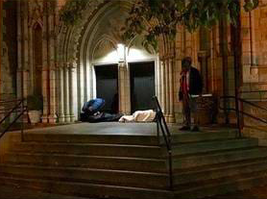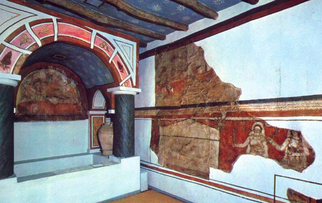 Sometimes chapter divisions can detour from hearing what the author of a biblical text has said. This is so true of 1 Corinthians 13. Most, at least from all the sermons I have heard and the weddings I have attended attest. Nonetheless, chapter 12 and chapter 13 of 1 Corinthians are in need of being heard together as if there is no chapter division between them. In fact, there is a bookend link between 12:13 and 13:13: ζηλοῦτε δὲ τὰ χαρίσματα τὰ μείζονα (12:31a) μείζων δὲ τούτων ἡ ἀγάπη (13:13b) Even those who don’t know New Testament Greek can see it––you can see the word “greater” (μείζονα, 12:31a / μείζων, 13:13b) at the close of chapter 12 and the close of chapter 13. Different endings (like Spanish), of course, but the same word: μέγας (great/greater) in 12:31a and 13:13b. The NASB, as do other translations, offers what I think is a much better read than the ESV: “But earnestly desire the greater gifts” (12:31a, NASB) Don’t know why the ESV translates the word μέγας as “higher.” I suppose it could, but this doesn’t help the English reader. The mistranslation masks the bookends here, which, in turn, masks the dynamic relationship between 1 Corinthians 12 and 13–these two chapters need to be read as one. So you can see (and hear) what Paul has crafted (with my more word for word translation):
So what does this do for us as we read chapters 12 and 13 together? First, we take and read the two as one thread and not separate chapter 13 as if it is a stand-alone-text about the vague notion of “love.” Witnessed by the mistaken use of the “Love Chapter” during weddings. Chapter 12 is most certainly about church, so for Paul, chapter 13 is about church as well. Second, we just had a chapter (12) on the one body of Christ—and please understand Paul is specifically referring to local churches, meeting in someone’s home, thus, “To the church of God that is in Corinth,” 1:2a): one body, many members (cf. 12:12, 27). Paul begins with the spiritual gifts (12:1), to which he will return in chapter 14, but makes a turn toward people-related gifting at the end of our chapter 12: apostles, prophets, teachers, those that do miraculous gifts of healing, helping, administering, and of course tongues.
Yep. Everyone wants these powerful, status-granting, attention-centered spiritual gifts (let’s be honest). Thus, the need for chapter 13. So, Paul asks,
Yet, he says there is a better way, a more excellent way. Paul then concludes our chapter 12:
Then, Paul instructs his readers/listeners on this more excellent way:
Let’s read 12:27–13:3 as one thread, of course with my interpretative spin (but I think it’s there in Paul’s meaning, a fair reading):
Well, this is a radical thing we have going on here. A new community built on the Love, not status, education, bloodlines, abilities, usefulness, or even spiritual office or gifting. And, then the reader/listener has Paul’s final charge: “So now faith, hope, and love abide, these three; but the greatest of these is love” (13:13).
0 Comments
 Power does not naturally distribute power equitably. This is why, first and foremost, calling upon the powers to distribute power more fairly (whether government, industrial complexes, religious institutions, or business corporations) will not address the problem of power being more equitably distributed. When politicians and civic leaders get elected or into positions because they promise more equitable distribution of power, once in power, they have an idolatrous temptation to remain in power over the very people they claim to advocate for—so, they, too, will not naturally be given to share that power more equitably. As was once said, power corrupts; absolute power corrupts absolutely. The only place power is distributed equitably is at that Table in the (better, yet, a) gathered-church. And, this is exactly what happened in the Book of Acts. This is the background of New Testament Letters like Romans, Galatians, and James; and, for the early church (for the first 150 years or so) . . . and, which, now, should be happening at every gathered-church of strangers and unequals in every locale, on every street, in every neighborhood, and within every community. This is at least one reason why the church, a the local gathered-church, is so, so important. Where this isn’t happening in a local church (i.e., a gathering of strangers and unequals at worship and at Table), there needs to be lament and repentance and correction in righteousness. Our problem is that much of the church (local and institutional) has so aligned with Christendom (that is, a culture that steals from Christianity just enough to control the industrial-church-complex and its own citizenry, but is formed by power-idolatries, such as ours here in the West) that, we, too, have become a power (or powers) that do not naturally distribute power equitably. But this isn’t the gospel, nor is it the body of Christ prescribed in the New Testament. But we didn't learn Christ this way (Ephesians 4:20; cf. 4:17–32). Yet, this is the place (the gathered-church) where power is defeated (Ephesians 6:10-12; Colossians 2:15) and the place where the only power known is the crucified power of the cross of Christ (Gal 2:20). This is the place where “there is neither Jew nor Greek, there is neither slave nor free, there is no male and female” (Gal 3:28); for this is the place all, by one Spirit, have been “baptized into one body—Jews or Greeks, slaves or free—and all were made to drink of one Spirit” (1 Corinthians 12:13); a space “where no Greek and Jew is, that is (kai) [where there is no] circumcised and uncircumcised, barbarian, Scythian, slave, freeman, but all things and in all is Messiah” (Colossians 3:11, my translation). Given that we are subject and, too often, align ourselves to the powers (at least the side of power we like or identify with or the side that seems to give us power, which is an illusion, of course). It is too natural to believe our only recourse for justice is to call upon those in power (i.e., the State or the industrial-complex) to give up power and more equitably redistribute power. But they will not, no matter how much they promise. However, the harder work—which is God’s way in this world now that Christ Jesus has died, been raised, and ascended to the right hand of the Father, and the church, the local gathered-church is His body, His presence in a community—the harder work is ecclesiastical, not simply protest, advocacy, and, certainly not, voting correctly. Our contemporary church-power and the way we tend to advocate in the public square mimics the current systems of power, so it is natural to have “Christian leaders” gain power, who develop followings as a demonstration of their power, to call upon the powers of government and systems of power to do justly. And to punish those who do not. So, what we have—what we end up with--is only “power” vs. “power.” But what God wants is crucified with Christ-power among the church, that is, our local churches (rural, suburban, exurban, and urban), and in church planting (especially in the harder places, the hinterland places, the geographically “unlivable” (and unlikeable) places, the marginal places, the border-places, the places where there is the lack of power).
There is no doubt in my mind. There is no way around it. The issue and problems of justice are a Table issue where the gathered-church exists. We are called to the harder task, church, where justice, that is, the place where the more equitable distribution of power can be experienced, demonstrated, and displayed.
 Leveling Habits: The Table, Household Baptism, and Kiss that Changed Everything (B) Baptisms. Samaritan “men and women,” an Ethiopian eunuch, the oppressing-Christian-killing Saul, a military Gentile, a Gentile (single?) woman (and “her household”), a Gentile jailor (and “his household”), and an outlier, Corinthian Jew with a Gentile name, Crispus (and “all of his household”) are Luke’s narrative choices of “baptism” stories. Of course, there are multitudes more, but when Luke has a chance to write about baptisms, these are the ones he chose for us to know. In fact, the first time he mentions anyone being baptized after the initial Pentecost events, it is Samaritan “men and women” (8:9; 12).[1] And, the first time Luke tells of an individual that is baptized, it is a foreign eunuch, serving a pagan king (8:36–8). What are Luke’s narrative choices embedded in the “church” story telling us about “church”? The baptism habitus of the gathered-church amid the deipnon (Lord’s Supper) moved people of unequal social status into being “one in Christ” as individuals and as households (which included women, children, and slaves) amid intimacy, reclining among unequals, the risk of being seen as a treasonous gathering (for at a deipnon there were on-lookers), celebrating the death of a traitor acknowledged as Lord and Head of the new social group. Household baptism (along with Luke’s other narrative choices) displayed the counter-cultural and, thus, seditious nature of a gathered-church. This is further seen in NT cross-related texts, that is, trajectory application regarding the unequal “mix” of who made up the gathered-church. Paul links the reconciliation of Jews and Gentiles as a trajectory application of the cross: But now in Christ Jesus you who formerly were far off have been brought near by the blood of Christ. For He Himself is our peace, who made both groups into one and broke down the barrier of the dividing wall, by abolishing in His flesh the enmity, which is the Law of commandments contained in ordinances, so that in Himself He might make the two into one new man, thus establishing peace, and might reconcile them both in one body to God through the cross, by it having put to death the enmity (Eph 2:13–16). This reconciliation, wherein “the both” are created “one new humanity” (v. 15c),[2] is directly related to the nature of the church: “the both” are fellow citizens of God’s household that is growing into a holy temple in the Lord, being built together into a dwelling of God in the Spirit (vv. 19–22). The unequal-oneness is the trajectory application of the death of Jesus. Later, Paul calls the church to unity through the imagery of its “one baptism” (4:5). Paul associates baptism with Christ’s death: Or do you not know that all of us who have been baptized into Christ Jesus have been baptized into His death? (Rom 6:3).[3] This is important, for Paul, then, links baptism to the nature of the gathered-church. The Colossian believers, Paul writes, have been buried with Christ “in baptism” (2:12a) and as a result, they are to set their minds on things above where Christ is seated at the right hand of God (3:1). This is directly related to the Colossian gathered-church’s identity: Do not lie to one another since the old man is laid aside with its practices and the new [man] is put on that is being renewed into the image according to the one who created it, where no Greek and Jew is, that is (kai) [where there is no] circumcised and uncircumcised, barbarian, Scythian, slave, freeman, but all things and in all is Messiah [my translation] (3:9-11). The setting is most certainly the deipnon (cf. 3:12–16) and the letter itself most assuredly was read at the after-meal symposium. Furthermore, in other passages Paul links baptism habitus to the associations within the gathered-church: For by one Spirit we were all baptized into one body, whether Jews or Greeks, whether slaves or free, and we were all made to drink of one Spirit (1 Corinthians 12:13). The gathered-church exists where unequals are present (and welcome) and there is no ethno-centric center of power. Furthermore, this cross/baptism-nature of church is applied to the gathered-church in Corinth regarding the Lord’s Supper and offers more support for a better reading of the Corinthian “table” issue (1 Cor 11). Paul links their baptism as a sign of their oneness (i.e., one body, 1 Cor 12:13a) and, then made trajectory application of whether Jews or Greeks, whether slaves or free, and we were all made to drink of one Spirit (v. 13b) to the issues experienced at the meal/table (i.e., the deipnon). Participation in the Lord’s Supper (the habitus) is itself to be proclamation of Messiah’s death (v. 26, For as often as you eat this bread and drink the cup, you proclaim the Lord’s death until He comes), but was not so in the divisions made at the deipnon food habitus: . . . when gathering together as church, I hear that divisions exist among you . . . Therefore when gathering together, it is not to eat the Lord’s Supper [deipnon] (vv. 18, 20; my translation). [1] My italics to emphasize the inclusion of Samaritan (which is itself impacting) women being baptized. [2] NIV (2011). [3] See Rom 6:4: We were buried therefore with him by baptism into death, in order that, just as Christ was raised from the dead by the glory of the Father, we too might walk in newness of life. This is a thread consisting of parts of a a recent paper presented at the 2017 Evangelical Theological Society's annual meeting in Providence, RI. The goal is to develop an anthology of essays (by various authors) on the subject, Christian Responses to Tyranny. Part 1 | Part 2a | Part 2b | Part 2c | Part 3 | Part 3a | Part 3b | Part 4a | Part 4b | Part 5 For the entire thread (remember to scroll backwards for previous posts) << Gathered-church >>
|
AuthorChip M. Anderson, advocate for biblical social action; pastor of an urban church plant in the Hill neighborhood of New Haven, CT; husband, father, author, former Greek & NT professor; and, 19 years involved with social action. Archives
February 2024
Categories
All
|
Pages |
More Pages |
|
 RSS Feed
RSS Feed